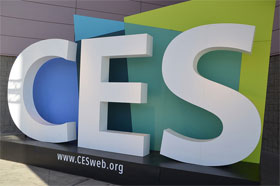At many major tech conferences, one big story–a product, technology, or trend–dominates the entire show.
 CES 2012 was not one of those events. Intel’s Ultrabook was the closest thing there was to a show-dominating topic, but in the end, what I was struck by was the diversity of stuff on display at the Las Vegas Convention Center and surrounding venues. And in some cases, the no-shows were as interesting as the products that were there.
CES 2012 was not one of those events. Intel’s Ultrabook was the closest thing there was to a show-dominating topic, but in the end, what I was struck by was the diversity of stuff on display at the Las Vegas Convention Center and surrounding venues. And in some cases, the no-shows were as interesting as the products that were there.
Herewith, a few of the lessons I took home with me after four jam-packed days in Vegas:
Giant OLED TVs aren’t inherently amazing. It’s a long-standing CES tradition for TV makers to try and out-do each other with demos of high-end big screens that won’t wind up in many living rooms anytime soon. This year, the makers in question were LG and Samsung, which had 55-inch OLED TVs at their booths. I checked out both sets–and didn’t come away lusting after either one. The LG, at least when I saw it, was displaying gimmicky 3D videos, which made it hard to judge how good it would be for anything else. And the video clips I saw on the Samsung were way over-saturated, giving everything an artificial, candy-colored effect that reminded me of some OLED smartphones.
Windows Phone was the mobile platform of the year. At CES 2011, Android devices such as Motorola‘s Xoom tablet and Atrix phone generated a huge amount of buzz. This year, however, I heard more chatter about Windows Phone–especially Nokia’s promising Lumia 900. For awhile now, folks who have tried Windows Phone have been impressed by it; now even industry types who haven’t used it seem to have a favorable impression. It’ll be fascinating to see if Microsoft can translate all that goodwill into the one thing Windows Phone doesn’t have: meaningful market share.
Android 4.0 Ice Cream Sandwich still isn’t the current version of Android. At least if “current” means that you can safely assume it will come preinstalled on brand-new devices. Upcoming phones such as Droid Razr Maxx will ship with 2010′s Android 2.3 Gingerbread, with the promise of an Ice Cream Sandwich upgrade at a future date.
Once again, it isn’t the year of the tablet. At CES 2011, Motorola’s Xoom and RIM’s BlackBerry PlayBook got so much attention that it would have been rational to expect that non-iPad tablets were about to chip away meaningfully at Apple’s head start. A year later, though, the market has changed surprisingly little. And while there were plenty of new tablets at CES 2012, most of them didn’t make much of a splash. The most newsworthy one was probably Samsung’s Galaxy Note–a pocket-size device that’s either a tablet-esque phone or a phone-like tablet.
3D TV is no longer cool. I’m not saying that it’s a failure, but for the most part, TV companies weren’t pushing it as the future of home entertainment. (LG’s extremely 3D-centric booth was an exception.) As Samsung’s press conference, for instance, Boo-Keun Yoon, president of the company’s consumer electronics division, said that Samsung is “continuing to invest heavily” in 3D TV. But the press conference emphasized Internet connectivity, not 3D.
Thunderbolt is making progress. The connectivity standard, invented by Intel, is pretty darn neat. Until now, however, it’s only shown up on new Macs and a handful of peripherals. That’s why I was happy to see it figure in several announcements at CES. Acer’s Aspire S5 Ultrabook, for instance, is one of the first Windows computers with a Thunderbolt port. Seagate showed off adapters, due in January, that turn its external drives into Thunderbolt drives. And Western Digital gave a sneak peek of Thunderbolt disks it plans to ship by mid-2012.
Gesture and voice input could be CES 2013′s biggest story. Using body motion and voice to control consumer-electronics devices was a mini-trend at this year’s show, thanks to debutantes such as Microsoft’s Kinect for Windows and Samsung’s TV with gesture and voice control. I’m betting that both types of input will get lots more attention at next year’s conference–especially if the conventional wisdom that Apple is working on a TV with Siri voice control turns out to be true.
I came back from CES 2012 feeling smarter about the consumer-electronics industry, and better prepared for the year to come. That’s all you can ask of an event like this. It’s more than enough to keep the show valuable even in an era when giant trade shows are an endangered species.
Related posts:

Recent Comments